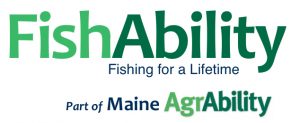Fishermen and Back Pain
By Brie Weisman, Occupational Therapist
Also published by Commercial Fisheries News, April 2021
FishAbility for Maine Fishermen – April 2021
Back pain is a common complaint of commercial fishermen worldwide. In a 2016 OSHRI study, fully 50% of participating lobstermen in the Northeast reported having lower back issues. This should surprise no one.
Most fishing industry jobs are physically demanding, repetitive, and conducted in an environment that is often both slippery and in motion — sometimes violently so.

Although it is easy enough to see how work accidents might cause back injuries, the cumulative nature of a long career in the industry is more often the source of fishermen’s back injuries. And, while one can hardly be a fisherman without a willingness to work despite discomfort, the reality is that ignoring certain back pain is as reckless as ignoring a strange engine noise. Aches or minor pains that are not addressed can increase or become injuries that require expensive medical care and downtime— or lead to chronic conditions that cannot be fully recovered from.
Fortunately, pain and fatigue come before injury for a reason; they are the body’s warning lights. Knowing how to respond to them is the key to back health. Below are simple, effective techniques to address back pain that takes little time, and little money.
Limit Bending, Lifting, and Twisting (BLT):
- To reduce bending, elevate work to keep the back as straight as possible.
- Instead of lifting with your back, squat with a straight back and lift with your legs, holding items close to your chest.
- Instead of twisting the body, adjust your feet so that you face the item or task.
- Instead of lifting items, slide them on a surface, or use a wheeled cart.
- Consider working in a kneeling position for some tasks when appropriate. Knee pads might help in some cases.
Stretch Breaks:
- Implement a short, daily stretching or core strengthening program.
- Take stretch breaks throughout the day, especially when sore or stiff.
- Talk to your Primary Care Provider (PCP) about a routine that is right for you.

Photo credit: Nate Perry
Keeping it Local
Nate Perry, 39, grew up in a lobstering family and has been in aquaculture for 10-12 years. Nate owns Pine Point Oyster Co., LLC. He works alone, with occasional help from interns and university students.
What do you Iike the most about your work?
I wanted to do something that is sustainable and work on the water. I enjoy being out on the boat and seeing the farm work…seeing things grow.What do you like the least about your work?
Dealing with fouled equipment and the administrative side of fishing, which is equally important.Are there things that surprised you that you were not expecting regarding scallop farming?
So much encouragement, support and promise. I get advice from the university and lobstermen.What is the most physically demanding part of your job?
Lifting folded cages over the rail. It’s just like lobstering: pulling something up and over, out of the water and into the boat. I intend to fabricate something to reduce the lifting, like on a traditional hauler. It’s hard to get fishermen to talk about this stuff, working smarter. I’d guess 5% of people don’t have injuries on-going, but no one seems to want to discuss it.How do you address physical challenges?
I have rotator cuff issues. And it’s easy to pull something in your back. You can feel it for weeks before it goes away. A while ago I did some PT (physical therapy) because the rotator cuff was not getting better. Stretches and exercises do help. If you start compensating for something, you’re not at full strength.One thing can’t leave the dock without.
My notes.Tips, tricks or thoughts to share?
Always try to find the next warmest pair of gloves. Right now it is Atlas gloves.

